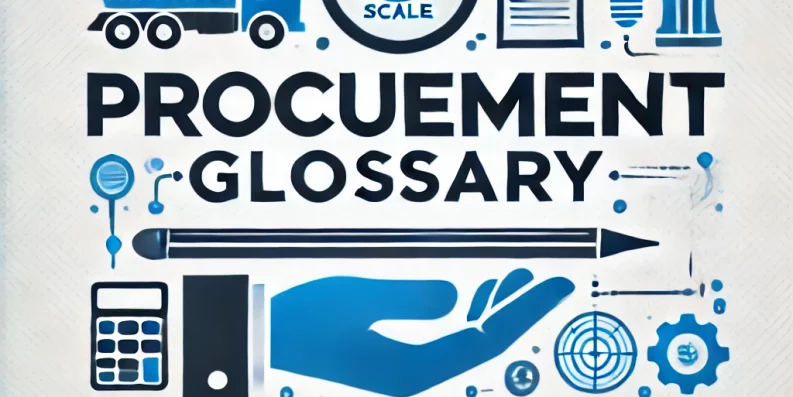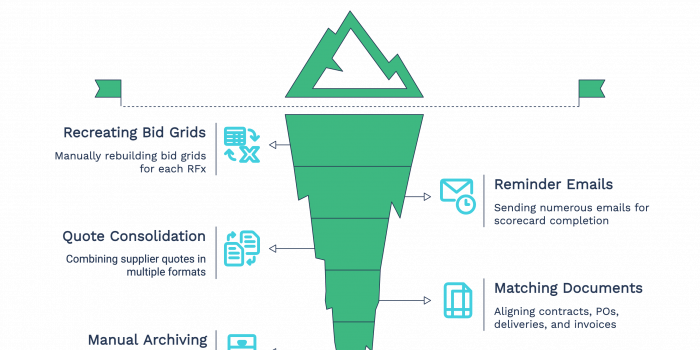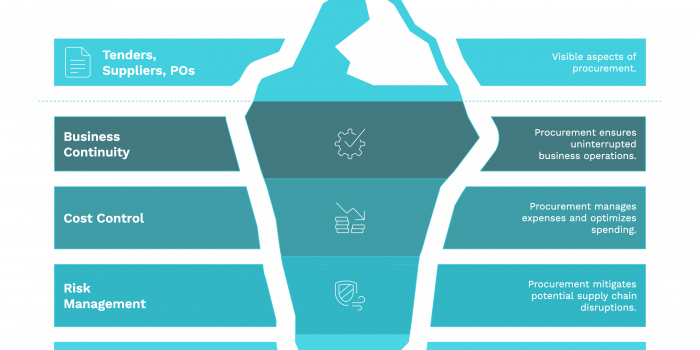Procurement Glossary
Our comprehensive procurement glossary is designed to help you navigate industry terms and enhance your sourcing expertise

A
- Acceptance Criteria: The specific conditions under which a product or service is considered satisfactory and will be accepted by the buyer.
- Approved Supplier List (ASL): A list of suppliers that have been evaluated and approved for purchasing based on their ability to meet specific criteria.
- Arbitration: A method of dispute resolution where an impartial third party makes a binding decision to resolve a conflict between the buyer and supplier.
- Amendment: A formal change or addition made to a contract or agreement.
- Aggregate Demand: The total demand for goods and services within an organization or market over a specific period.
- Acquisition: The process of obtaining goods or services, typically involving negotiation and contract formation.
B
- Bid: An offer submitted by a supplier in response to an invitation to tender (ITT), request for quotation (RFQ) or request for proposal (RFP).
- Bill of Materials (BOM): A comprehensive list of materials, components, and assemblies required to construct, manufacture, or repair a product or service.
- Blanket Purchase Order: A long-term purchase agreement that allows multiple deliveries over a set period without needing a new order for each delivery.
- Benchmarking: The process of comparing procurement processes and performance metrics to industry best practices to identify areas for improvement.
- Bonded Warehouse: A secure storage area where goods are held until customs duties are paid or they are re-exported.
C
- Contract: A legally binding agreement between two or more parties outlining the terms and conditions for the supply of goods or services.
- Category Management: A strategic approach to procurement where products or services are segmented into categories, allowing for more focused and efficient management.
- Consignment Inventory: Inventory that is in the possession of the buyer but remains the property of the supplier until it is used or sold.
- Cost-Benefit Analysis (CBA): A process of comparing the costs and benefits of different procurement options to determine the best value for money.
- Compliance: Adherence to laws, regulations, and organizational policies in procurement activities.
- Continuous Improvement: An ongoing effort to enhance procurement processes and outcomes through incremental improvements.
D
- Delivery Schedule: The timetable agreed upon between the buyer and supplier for the delivery of goods or services.
- Due Diligence: The process of investigating and evaluating a supplier’s capabilities, financial health, and compliance with regulations before entering into a contract.
- Direct Procurement: The purchasing of goods, materials, and services that are directly used in the production of the company’s goods or services.
- Dispute Resolution: The methods used to resolve conflicts or disagreements between the buyer and supplier, including negotiation, mediation, and arbitration.
- Drop Shipment: A supply chain management technique where the supplier ships goods directly to the end customer on behalf of the buyer.
E
- E-Procurement: The use of electronic systems and tools in the procurement process, from sourcing to payment.
- Evaluation Criteria: The specific factors and standards used to assess and compare supplier proposals or bids.
- Escrow: A financial arrangement where a third party holds funds until the completion of specific contractual obligations.
- Ex Works (EXW): An Incoterm where the buyer takes on all costs and risks of transport from the supplier’s premises.
- Enterprise Resource Planning (ERP): Integrated management software that automates and manages core business processes, including procurement.
F
- Framework Agreement: A long-term agreement with a supplier or suppliers that sets out terms and conditions under which specific purchases can be made during the agreement period.
- Force Majeure: A clause in contracts that frees both parties from liability or obligation when an extraordinary event or circumstance beyond their control occurs.
- Free on Board (FOB): An Incoterm where the seller delivers goods onto a vessel chosen by the buyer, at which point the risk and cost transfer to the buyer.
- Functional Specification: A document that defines the technical and performance requirements of the goods or services being procured.
- Forecasting: The process of predicting future demand for goods or services to inform procurement planning.
G
- Goods Receipt Note (GRN): A document used to record the receipt of goods delivered by a supplier, verifying that the delivery matches the purchase order.
- Green Procurement: The practice of purchasing products and services that have a reduced environmental impact throughout their life cycle.
- Governance: The framework of rules, practices, and processes by which procurement activities are directed and controlled.
- Group Purchasing Organization (GPO): An entity that leverages the collective buying power of its members to obtain better pricing and terms from suppliers.
H
- Harmonized System (HS) Code: An internationally standardized system of names and numbers for classifying traded products.
- Hold Harmless Agreement: A contractual clause where one party agrees not to hold the other party liable for any loss, damage, or legal liability.
- Horizontal Integration: The acquisition or merger of companies operating at the same level in an industry supply chain.
I
- Incoterms: International commercial terms published by the International Chamber of Commerce (ICC) that define the responsibilities of sellers and buyers for the delivery of goods under sales contracts.
- Invitation to Tender (ITT): A formal invitation issued by a buyer to suppliers to submit a bid for the supply of goods or services.
- Indirect Procurement: The purchasing of goods and services that are not directly incorporated into the company’s final product but are necessary for daily operations.
- Inspection: The process of examining goods or services to ensure they meet the specified quality and performance standards.
- Inventory Management: The supervision of non-capitalized assets, or inventory, and stock items.
J
- Just-in-Time (JIT): An inventory management strategy where materials are ordered and received only as they are needed in the production process.
- Joint Ventures: Business arrangements where two or more parties agree to pool their resources for the purpose of accomplishing a specific task or project.
- Joint Procurement: A procurement method where multiple organizations combine their purchasing power to achieve better terms and pricing.
K
- Key Performance Indicators (KPIs): Metrics used to evaluate the success and performance of a supplier or procurement process against defined objectives.
- Knowledge Management: The process of capturing, distributing, and effectively using knowledge within the procurement function.
- Kaizen: A Japanese term meaning “change for the better” or “continuous improvement,” used in business for quality and productivity improvement.
L
- Lead Time: The time taken from placing an order to the delivery of goods or services.
- Letter of Credit (LC): A financial document issued by a bank guaranteeing a buyer’s payment to a supplier will be received on time and for the correct amount.
- Logistics: The planning, implementation, and control of the movement and storage of goods and services from the point of origin to the point of consumption.
- Landed Cost: The total cost of a product once it has arrived at the buyer’s door, including the original price, transportation fees, customs, duties, taxes, insurance, currency conversion, and handling fees.
M
- Market Analysis: The process of assessing the supply market to identify potential suppliers, pricing trends, and market conditions.
- Master Agreement: A comprehensive contract that sets out terms and conditions for future transactions between the buyer and supplier.
- Material Requirements Planning (MRP): A system for calculating the materials and components needed to manufacture a product.
- Mediation: A method of dispute resolution involving a neutral third party who helps the buyer and supplier reach a mutually agreeable solution.
- Multi-Sourcing: The practice of sourcing a product or service from multiple suppliers to reduce risk and increase competition.
N
- Negotiation: The process of discussing and reaching an agreement on the terms and conditions of a contract between a buyer and supplier.
- Non-Disclosure Agreement (NDA): A legal contract that ensures confidentiality and prevents the sharing of sensitive information between parties.
- Net Present Value (NPV): A financial metric that calculates the present value of future cash flows minus the initial investment cost.
- Non-Conformance Report (NCR): A document used to report any deviations from the agreed standards or specifications in the delivered goods or services.
O
- Order Acknowledgment: Confirmation from a supplier that they have received and accepted a purchase order.
- Outsourcing: The practice of contracting out certain business functions or processes to an external supplier.
- Open Book Contracting: A transparent approach to contracting where the supplier shares detailed cost information with the buyer.
- Operational Procurement: The day-to-day procurement activities that ensure the supply of necessary goods and services to keep the organization running.
P
- Purchase Order (PO): A formal document issued by a buyer to a supplier detailing the products or services to be purchased, quantities, and agreed prices.
- Procurement Cycle: The complete process from identifying a need for goods or services to their acquisition and payment.
- Public Procurement: The process by which government departments or agencies purchase goods, services, and works from the private sector.
- Prequalification: The process of evaluating potential suppliers based on their ability to meet certain criteria before they are allowed to participate in the bidding process.
- Payment Terms: The conditions under which a supplier will complete a sale, typically specifying the period allowed to a buyer to pay off the amount due.
Q
- Quality Assurance (QA): A systematic process of ensuring that products or services meet specified requirements and standards.
- Quotation: A document provided by a supplier detailing the cost and terms for the supply of goods or services in response to a request for quotation (RFQ).
- Quality Control (QC): The process of inspecting and testing products to ensure they meet the required specifications and standards.
- Quick Response (QR): A strategy used in the retail industry to reduce lead times and increase the speed of supply chain processes.
R
- Request for Proposal (RFP): A document issued by a buyer inviting suppliers to submit a proposal for the supply of goods or services.
- Requisition: An internal document used to request the procurement of goods or services within an organization.
- Risk Management: The process of identifying, assessing, and mitigating risks associated with the procurement process.
- Reverse Auction: An online auction where suppliers compete to offer the lowest bid for a contract.
- Receiving Report: A document used to confirm that the goods received match the purchase order in terms of quantity and quality.
S
- Supplier Relationship Management (SRM): The strategic approach to managing an organization’s interactions and relationships with suppliers.
- Service Level Agreement (SLA): A contract between a buyer and supplier that defines the level of service expected from the supplier.
- Sourcing: The process of identifying, evaluating, and selecting suppliers to provide goods or services.
- Spend Analysis: The process of collecting, cleansing, classifying, and analyzing expenditure data to improve procurement efficiency and reduce costs.
- Stock Keeping Unit (SKU): A unique identifier for each distinct product and service that can be purchased.
T
- Total Cost of Ownership (TCO): The complete cost of acquiring, operating, and maintaining goods or services over their entire lifecycle.
- Tender: A formal offer made by a supplier in response to an invitation to tender (ITT).
- Terms and Conditions: The detailed provisions and requirements in a contract or purchase order.
- Third-Party Logistics (3PL): The use of external companies to manage logistics and supply chain functions.
- Transparency: The practice of maintaining openness and clarity in procurement processes, ensuring all actions and decisions are visible to stakeholders.
U
- Uniform Commercial Code (UCC): A set of laws regulating commercial transactions in the United States.
- Unsolicited Proposal: A proposal submitted by a supplier to a buyer without a formal request or solicitation.
- Uptime: The amount of time a system or equipment is operational and available for use.
- Utilization: The extent to which a company’s resources, such as equipment or inventory, are used efficiently.
V
- Value Analysis: The process of examining the functions of goods or services to reduce cost and improve performance without compromising quality.
- Vendor Managed Inventory (VMI): A supply chain initiative where the supplier is responsible for managing and replenishing inventory based on agreed-upon levels.
- Value for Money (VFM): The concept of obtaining the best possible combination of quality, features, and price in procurement.
- Verification: The process of ensuring that the delivered goods or services meet the agreed-upon specifications and requirements.
W
- Warranty: A guarantee provided by a supplier regarding the condition, performance, or durability of the goods or services supplied.
- Work Order: A document authorizing the commencement of work or services in accordance with the terms and conditions agreed upon.
- Workflow: A sequence of steps or processes that are followed to complete a procurement task or activity.
- Weighted Scoring: A method of evaluating supplier proposals by assigning different weights to various criteria based on their importance.
X
- Expediting: The process of ensuring that goods or services are delivered on time by closely monitoring and managing the progress of orders.
- Exception Management: The process of identifying and handling deviations from standard procurement processes or expected outcomes.
Y
- Yield Management: A strategy used to optimize the procurement process by balancing supply and demand to maximize value and efficiency.
- Year-over-Year (YoY): A comparison of procurement performance metrics from one year to the next to assess growth and improvement.
Z
- Zero Defects: A quality management concept aimed at eliminating defects in products or services through continuous improvement and stringent quality control measures.
- Zone Pricing: A pricing strategy where the price of goods or services varies based on the geographic location of the buyer.







